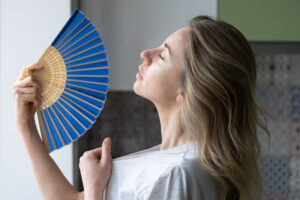 A high percentage of women in the pre-menopause and post-menopause years experience hot flashes and night sweats.
A high percentage of women in the pre-menopause and post-menopause years experience hot flashes and night sweats.
In fact, the National Institutes of Health recently published a report called the “State-of-the-Science Statement on the Management of Menopause-Related Symptoms.”
In that article, the authors write that 30% to 80% of women in menopause regularly experience this sudden, intense, hot, perspiring feeling in their face and upper body.
A diminished level of estrogen has a direct effect on the hypothalamus, the part of the brain responsible for controlling our body temperature, sleep cycles, and hormones. The menopausal drop in estrogen confuses the hypothalamus, which is sometimes referred to as the body’s “thermostat”, and makes it read “too hot.”
Lifestyle Tips
Here are some things you can do to reduce the discomfort from hot flashes and night sweats.
Dress in layers so you can peel them off as you get warmer. Stick to loose clothing of cotton, linen or rayon and avoid synthetic fabrics and wool. Check into “Wicking Nightwear.” These nightclothes are designed to whisk away sweat and moisture and keep you dry and comfortable while you sleep. Cotton sheets are best.
Have you heard of “Cleavage Coolers”? These are small fabric covered gel packs that can be frozen overnight. When a hot flash starts, place one inside your shirt or bra to help you cool down fast. These stay cold in your bra for up to three hours.
Use full-size fans, a ceiling fan, or an air conditioner to cool off your space at work or home. A portable hand-held battery-operated fan can also be kept in your purse. Also keep a thermos of ice water with you at work and at home.
Try a “Chillow” pillow insert for night sweats. The Chillow is filled with water and placed inside the pillowcase, on top of the pillow. It absorbs and dissipates heat to keep you cooler and doesn’t require refrigeration. It is comfortably cool, rather than cold and it always stays dry.
Menopause Remedies
Hops flowers are best known for their role in brewing beer. You can also find hops extract in herbal remedies designed to calm and relax. In one animal study from the Journal of Endocrinology, the phyto (plant) estrogen from hops was found to be equally as effective as an estrogen drug in reducing hot flashes and lowering high body temperature in menopause. In fact, the beneficial effects lasted five days after the hops extract was withdrawn, compared to four days after the estrogen.
 Vitamin E is a proven remedy for hot flashes. One study supporting vitamin E is from the University of Iran, published in “Gynecologic and Obstetric Investigation” in 2007. 400 IU of vitamin E in a softgel cap was given to the participants daily for four weeks. A diary was used to measure hot flashes before the study and at the end. The researchers concluded that vitamin E is an effective, recommended treatment for hot flashes.
Vitamin E is a proven remedy for hot flashes. One study supporting vitamin E is from the University of Iran, published in “Gynecologic and Obstetric Investigation” in 2007. 400 IU of vitamin E in a softgel cap was given to the participants daily for four weeks. A diary was used to measure hot flashes before the study and at the end. The researchers concluded that vitamin E is an effective, recommended treatment for hot flashes.
Sleep Remedies
According to the journal article on the management of menopause-related symptoms, women seem to have more sleep disturbances as they progress through the menopausal stages. The prevalence of sleep disturbance varies from 39% to 47% in perimenopause, and from 35% to 60% in postmenopause. Night sweats and hot flashes can become a form of insomnia in which a woman wakes up drenched in sweat and unable to sleep.
Regarding mineral deficiency at the time of menopause, Nutritionist Adelle Davis says,  “The amount of calcium in a woman’s blood parallels the activity of the ovaries. During the menopause, the lack of ovarian hormones can cause severe calcium deficiency symptoms to occur, including irritability, hot flashes, night sweats, leg cramps, and insomnia. These problems can be easily overcome if the intakes of calcium, magnesium, and vitamin D are all generously increased and are well absorbed.”
“The amount of calcium in a woman’s blood parallels the activity of the ovaries. During the menopause, the lack of ovarian hormones can cause severe calcium deficiency symptoms to occur, including irritability, hot flashes, night sweats, leg cramps, and insomnia. These problems can be easily overcome if the intakes of calcium, magnesium, and vitamin D are all generously increased and are well absorbed.”
One insomnia remedy becoming popular among menopausal women is Sleep Minerals II from Nutrition Breakthroughs. This natural sleep remedy contains highly absorbable forms of calcium, magnesium, vitamin D and zinc. It is formulated in a softgel with healthy carrier oils, making it more quickly absorbable than tablets or capsules and providing a deeper, longer-lasting sleep.
Anita L. of New Caney, Texas says: “I was having hot flashes every 30 minutes to an hour through the night and was so miserable. After about two weeks of taking the Sleep Minerals, I noticed an incredible difference with my sleep. I have much less interruption from hot flashes, I m sleeping much better, and I’m a lot more comfortable.”
Valerie H. in Santa Clarita, California. says: “I had such severe menopause insomnia it took me hours to get to sleep even though I was extremely tired. I also had creepy crawly and tingling feelings in my legs at night. I got the Sleep Minerals and started taking it and after about a week it started to work really well. I fall asleep now within 20 minutes and no more restless legs.”
So if you are suffering with hot flashes or night sweats, try some of the ideas above to stay cool as a cucumber!
For more information, visit the on Sleep Minerals II page.
A diminished level of estrogen has a direct effect on the hypothalamus, the part of the brain responsible for controlling our body temperature, sleep cycles, and hormones. The menopausal drop in estrogen confuses the hypothalamus, which is sometimes referred to as the body’s “thermostat”, and makes it read “too hot.”
Dress in layers so you can peel them off as you get warmer. Check into “Wicking Nightwear.” These nightclothes are designed to whisk away sweat and moisture and keep you dry and comfortable while you sleep. Cotton sheets are best.
Use full-size fans, a ceiling fan, or an air conditioner to cool off your space at work or home. A portable hand-held battery-operated fan can also be kept in your purse. Also keep a thermos of ice water with you at work and at home.
This varies for every woman. During the menopause, the lack of ovarian hormones can cause severe calcium deficiency symptoms to occur, including irritability, hot flashes, night sweats, leg cramps and insomnia. These problems can be easily overcome if the intakes of calcium, magnesium, and vitamin D are all generously increased and are well absorbed.


